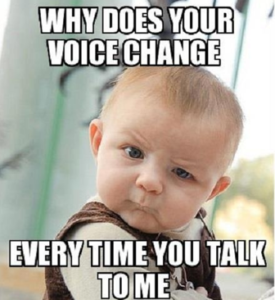Ask any mom what her hopes and dreams are for her children, and something having to do with their future success can likely be found near the top of her wish list. As we know, this is largely linked to development which encompasses more psychological arenas than we have time to cover in a single blog entry. One of the major infant and toddler milestones concerns language development. How many of us engaged with our tiny tots and frequently pondered what their first word would be? Many mothers allow all the child development literature out there to scare them into believing something is wrong when their child doesn’t speak exactly on cue at a certain month or year, but I think most of us can agree that there’s no “one size fits all” when it comes to your kid’s growth.
Watching your baby grow into this little being with a personality all his own is exciting. Every stage brings something different, and often you could never predict what will come next. For example, I once had a boss who had twin girls. I got to know his family well while working with him, and I found his interaction with his children intriguing. He addressed them by their names and spoke in complete, adult sentences to them all the time. I often wondered how anyone could look at their cute little faces and not immediately launch into a bunch of “ooh’s”, “ahh’s” and “goo-goo gah-gah” talk. Not this parent; he was deliberate about speaking in plain english and had absolutely no reservations about it. His girls at age 4 had amazing vocabularies, and I thought it was incredible. I made a promise to myself: “When I have children, I’m doing that too!” It’s safe to say I failed to keep my word on that one.

There’s just something about babies! Those cherubic-faced, bright eyed, squishy-bodied cuties elicit this reflexive response when you lay eyes on them and all of a sudden find yourself reduced to a pile of mush! I don’t know what it is, but it almost feels instinctual – so much so that I decided I needed to just trust it.
The verdict is still out on baby talking to infants and young children. Experts are split on their opinions about the good or harm it will do. One school of thought believes that there is nothing wrong with baby talk, while the other believes it has the ability to stunt linguistic growth. It’s critical that before we dive into my personal theory, we differentiate between baby talk and what’s known as “Parentese” or “Motherese”. Baby talk is stringing a bunch of nonsensical and unintelligible sounds together. Motherese is more of a sing-songy speech with elongated vowels and high pitched voice. The musical tone of the language, usually paired with exaggerated facial movements, plays a big role in helping grab the baby’s attention and form connections with mom. Though the sound is different from that which you’d hear in a normal adult conversation, the words are comprehensible. Researchers who favor motherese believe it helps greatly with language acquisition because it encourages babbling. Babies who babble are one step closer to speaking, so it’s a promising indicator!
When kids are a bit older and out of the infancy stage, you can be a bit more creative with the way you verbally interact with them. I remember telling Kingsley to “use your words” repeatedly, but kids at that age don’t always have the language to express themselves.
I don’t think there’s one sole strategy that will ensure your kid will have an expansive vocabulary, and I’m not sure choosing either side will be harmful, either. I believe the key is in pointing all efforts towards the development of several areas of the brain. I can tell you that I talk to my children and make an intentional choice to use words that will increase the dictionary in their little mental rolodexes. However, I also make it a point to do things with them like watching animal planet videos and playing around with my DJ software programs. I’m finding that many of their words come from experiences and exposure as well as convos with mom.
Adults sometimes assume that children aren’t aware, simply because they aren’t using language yet. This is perhaps one of the biggest mistakes to make, because most children are like little sponges perceiving everything in their surroundings. You can’t always tell what they’re grasping or what their brilliance will become until much later. Whether you choose to give into the intrinsic baby talk delivery or go with the more calculated Motherese, cultivating your child’s skillset is a process you’ll find you have to figure out day by day. As you unveil all this world has to offer, your children will undoubtedly amass not only strong linguistics, but maturity in experiences along the way, as well.




replies (0)